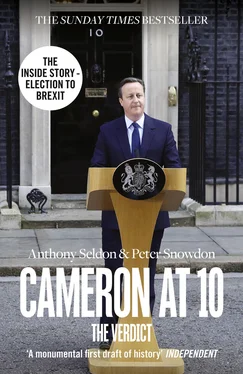Cameron’s decision to forge a new deal on Europe and defy the doomsayers in his party has been dismissed by many as foolhardy political expediency. The Bloomberg speech, it is alleged, was an exercise in party management to neutralise the issue until after the 2015 general election. It certainly appeased a growing number of Brexiteers on the front and back benches. But this view dismisses Cameron’s genuine desire to tackle the recurring sore of Europe and his belief that the country would have to address the issue sooner rather than later. It is hard to argue that he had ducked the problem. His error, which would prove fatal, came in the belief that he could secure more than he could from Britain’s European partners, telling the Conservative Party conference in 2014 that he would make progress on free movement and would not take ‘no’ for an answer. Angela Merkel, he hoped, would help him to persuade other European leaders to give Britain stronger safeguards against the swelling influx of migrants attracted by Britain’s strong economy.
Cameron pressed European leaders to cut him a deal in February 2016, believing, with George Osborne, that protracting it would only handicap their cause. The circumstances could not have been less propitious. The EU was in no mood to give Britain anything more, given the migration crisis on Europe’s borders and continuing uncertainty over the eurozone. The package of measures to restrict welfare benefits, provide financial safeguards and a commitment to protect Britain from ‘ever closer union’ did not meet the public’s expectations that Cameron and his team had raised. ‘He was very defensive because he knew it was so hard to get, but most of us knew that even in his own head he was over-claiming,’ admits one. It was not enough to convince Boris Johnson or close ally and friend Michael Gove, whose decisions to join the Leave campaign would cost Cameron dearly.
By leading the charge for the Remain campaign rather than replicating Harold Wilson’s more removed role during the 1975 referendum – a lead Cameron was adamant he should take – he raised the stakes even further. ‘He could have played no further role in the campaign by playing the role of elder statesman,’ argues Graham Brady, chairman of the backbench 1922 Committee. ‘But he was determined to front the campaign and that immediately eroded his credibility.’ But not to have led from the front would have been a failure of leadership. He chose, however, to become highly partisan rather than maintain a more dignified distance, which lost him some dignity and authority. He thus exposed himself to accusations by his own ministers of lying and broken promises about key claims, including reducing immigration to the tens of thousands, and he did not stop direct and personal attacks on senior figures on the Leave side, principally Boris Johnson. When Cameron labelled Leave supporters as ‘Little Englanders’ and ‘quitters’, he managed to offend many grass-roots Conservatives across the country. When the Leave campaign relentlessly pushed the question of immigration, Cameron’s and Osborne’s warnings on the economic risks of leaving the EU lost their potency.
The failure of the Remain campaign and the reality of defeat will loom large in the nation’s mind for many years to come. But what are we to make of his record in office beyond the European question? We should not judge prime ministers as if they all served on a level playing field. Some come to power blessed with advantages, none more so in recent years than Tony Blair, who in 1997 inherited a strong economy, enjoyed a large majority and led a unified Labour Party. Cameron’s inheritance in May 2010 was one of the most challenging for fifty years, worse than the situation Wilson faced in 1974 or arguably even Thatcher in 1979. Yes, he had the good fortune to face Ed Miliband, then Jeremy Corbyn as Labour leader – Miliband’s brother and leadership contender in 2010, David, would have posed a greater challenge – and to have no serious rivals around the Cabinet table to spark a leadership election. Johnson, the one figure with more popular appeal to Tory voters, was ruled out by not being in Parliament until 2015. Where Blair had, in Gordon Brown, a chancellor who undermined him, significantly damaging his effectiveness as premier, Cameron had a chancellor who enhanced his own authority and effectiveness during the coalition. Cameron was fortunate too to have William Hague affirming his leadership, especially earlier in his premiership, with all the authority and experience a former party leader carries. His decision to form a coalition with the Liberal Democrats usefully shielded him from unpopular decisions, particularly over public spending cuts. By entering the coalition, the Liberal Democrats believed they were taking a brave decision – albeit one that would cost them dear at the polls.
But there the blessings end. Cameron’s difficulty in managing his party between 2010 and 2015 was exacerbated by his failure to win an overall majority in May 2010. He came to power at a time of the worst economic crisis since the 1930s. His response was to say that the coalition was ‘governing in the national interest’ – a phrase which imbued his speeches and statements for most of his first twelve months in power. The constraints of the economy and coalition politics were never far from the surface. Like Konrad Adenauer, chancellor of West Germany (1949–63), Cameron displayed uncanny instincts for holding his party and coalition together, but did not win over hearts and minds.
Cameron came to power at a time of widespread anti-establishment feeling and disillusion across the nation. It ultimately contributed to his undoing by way of the EU referendum defeat, and contributed to British politics being in an unusually febrile and volatile state after 2010. The stellar rise of UKIP in 2013–14 threatened the most dangerous split on the right for generations. Cameron had the Conservative press on his back, particularly from 2011–13, partly in anger at his setting up the Leveson Inquiry. As with John Major, but unlike with Margaret Thatcher, he had few cheerleaders among the right-wing commentariat or Tory grandees. Most were unwilling or unable to give him credit for his strengths and achievements, or to credit his difficulties. The Fixed-Term Parliaments Act 2011, designed to bind the coalition together, denied him the opportunity to threaten an election at a moment of his choosing, depriving him of a critical tool in disciplining his party. He faced a turbulent House of Lords, an assertive judiciary, rampant Scottish nationalism, and EU laws that, despite his repeated efforts, constrained his ability to limit EU immigration.
Such difficulties explain some if not all of Cameron’s problems. His unforced error in presiding over a confused message in the 2010 general election proved to be crucial. The direction of the Conservative campaign was split, and the prospectus divided between the optimistic if inchoate ‘Big Society’ and the overdone pessimism of austerity on the economy. The election could have been won outright against a discredited prime minister and Labour Party, and a country disillusioned with thirteen years of Labour rule. Cameron was thus to a significant extent the author of some of his own problems during these five years. He was determined not to preside over the same divided campaign in the 2015 election. Vindication followed with the party achieving an overall majority, its first in twenty-three years. Cameron’s victory confounded the predictions of opinion pollsters and many commentators from both sides of the political spectrum. Critics said he only won because of last-minute fears of an SNP–Labour alliance, but research suggests economic arguments and Cameron’s qualities over Miliband were decisive. Victory shattered Miliband’s Labour Party as well as Nick Clegg’s Liberal Democrats. Both parties lost their leaders after the general election and immediately descended into disarray. The Conservatives, despite their slender majority, gained a political hegemony and confidence in the months that followed which they had not known since before Black Wednesday in 1992. It was to be short-lived.
Читать дальше












